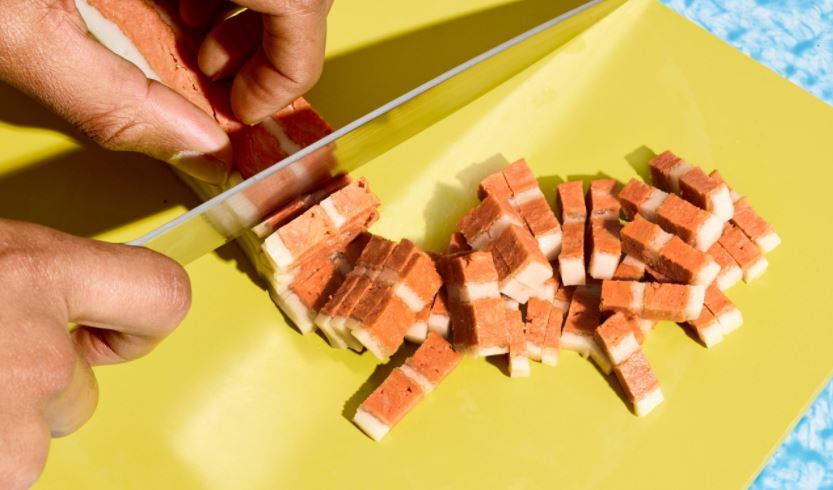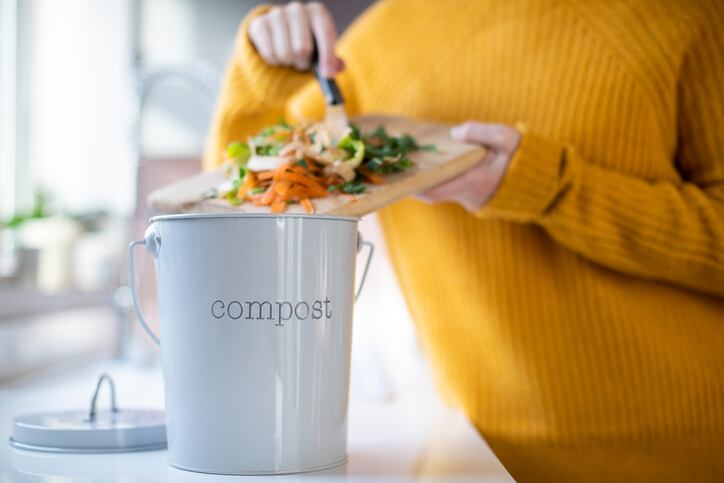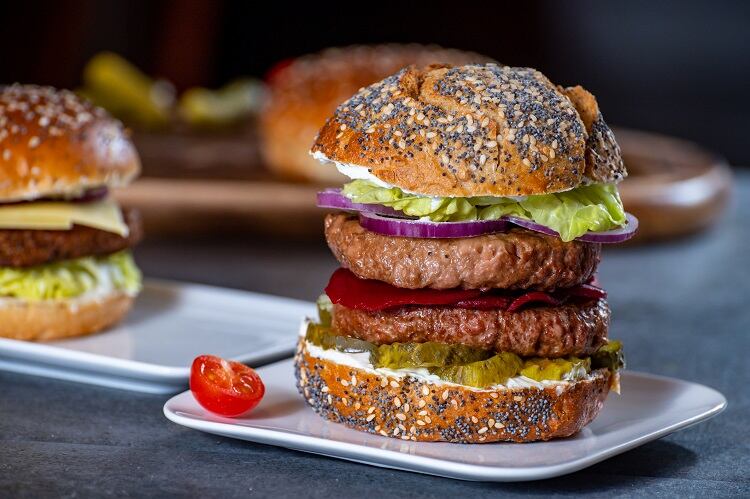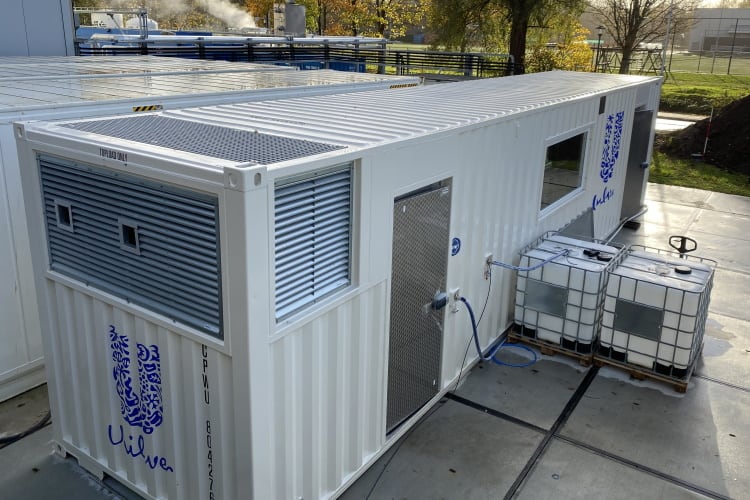The start-up, called 77 Foods, uses the plant-based fat tissue to make what it calls ‘insanely craveable’ plant-based bacon and lardons. It told FoodNavigator “the innovation is a game-changing, plant-based bacon that actually sizzles in the pan thanks to a patented technology that replicates animal fat tissue.”
Is fat the solution to current sensory gap in meat alternatives?
Nicolas Schweitzer co-founded Paris-based 77 Foods in 2019 with the conviction that “25 years from now most of the meat that we consume won’t come from animals”.
But meat alternatives currently lack the organoleptic qualities of the real thing, he said. “Meat is so delicious because of one main factor: fat. Animal fat is amazing. It will infuse in the meat and create an intensity and savouriness that is very hard to replicate with plant-based fats.”
Many meat alternatives often use coconut or palm oil as these are stable at room temperature. But they also have low melting points and contain unhealthy levels of saturated fat. “The plant-based industry has not figured out how to create vegetable fat that mimics animal fat,” Schweitzer said. “Without fat, meat alternatives are struggling to be as delicious as meat.”
Some start-ups, such as Hoxton Farms and Peace of Meat, are attempting to overcome the taste and functional barriers in meat alternatives by producing cultivated fat, or fat that's made using cells sourced from an animal. The 77 Foods solution, however, is a plant-based fat prototype that it claims mimics the characteristics of animal fat. After finding a lab, raising funds and hiring an R&D team, it then set about creating its first product.
“Obviously the most iconic product when it comes to fat is pork belly. So today we have bacon and lardons. The technical challenge was not only to develop the fat, but also the lean part -- and attach those two together. After 18 months of R&D research, it’s finally working. Our product is recreating the intensity and savouriness that you can get with bacon. I can honestly say there’s nothing like it and the product is amazing, with the same organoleptic pleasure that you would find with animal meat.”

Higher melting point
The plant-based fat tissue is an emulsion of plant oils, such as sunflower and canola, and water, that is stabilised with roots and algae to best mimic animal fat’s extracellular matrix, the young Frenchman elaborated. Thanks to this innovation, it is possible to make a plant-based adipose tissue that closely resembles that of meat that can be sliced, cooked, and slowly releases oil upon cooking.
"It's the only plant-based fat that you will find on the market that doesn't melt when you heat it,” he claimed. “The fat will infuse slowly in the matrix in the meat and it creates a really intense experience. With other alternative meat products, as soon as you put them in the pan all the oil just leaves the product because it's melting immediately."
The other main ingredient in the plant-based bacon is textured soy protein. The full product boasts a ‘fibrous texture, balanced nutritional profile and delicious taste’, according to the company, which claims that 92% of blind tasters preferred its bacon to real pork bacon.
“Bacon is probably not the best thing you can eat from a health perspective mostly because of the saturated fats,” added Schweitzer. “Since our fat is made from sunflower and canola oil, it’s very healthy from a saturated fat perspective. Our bacon also has a lot of fibre which is another plus.”

The other challenge for plant-based meat: price
Price is another factor that is hindering the development of meat alternatives. 77 Foods is looking to achieve economies of scale quickly thanks to a partnership with a co-manufacturer which will allow it to produce 2,000 tonnes per year. It is offering its products to existing brands and retailers in private label and co-branding.
“We’re really confident that with this type of innovation the revolution will happen and that 25 years from now you and your kids will eat mostly plant-based meat,” proclaimed Schweitzer.
The start-up’s confidence has now been recognised by Unilever. In partnership with the Future Food-Tech Summit and Kellogg Company, it launched the Innovation Challenge. Unilever told applicants it was looking for ingredients and processing technologies to improve taste, texture, sustainability and affordability of plant-based meat and dairy alternatives. This aligns with the company’s recently announced target to achieve €1 billion in annual sales of plant-based meat and dairy alternatives within the next five to seven years.
Six finalists were selected through an in-depth review and judging process to present their solution to the judges and audience at Future Food-Tech on March 11.
Potential partnership opportunities
André Pots, director of product and process science foods and refreshment at Unilever, shared the reasons for the chosen winner: “We were delighted to receive numerous applications from start-ups around the world, all keen to support Unilever with our plant-based challenge. 77 Foods, in our view, had the strongest consumer-centric pitch, highlighting the importance of the animal fat that gives delicious meat products its flavour when developing plant-based products. They claim to have cracked the savoury taste from conventional animal fat, which is not an easy one we know. We are looking forward to discussing opportunities with the 77 Foods team to support us in our mission to achieve annual sales of €1bn from plant-based meat and dairy alternatives.”
Kellogg Company was also involved in the challenge. Its Innovation Challenge award went to Brazilian company Fibervita, which is developing a proprietary technology at industrial scale to launch an upcycled ingredient portfolio, consisting of sustainable, multifunctional, versatile, healthy, clean label, allergen-, gluten- and GM-free cassava based fibrous ingredients.
For 77 Foods, the award brings “visibility and potential partnership opportunities”, Schweitzer revealed. “They [the judges] indicated and understood how fat is important on the overall flavour,” said Schweitzer. “Being in the industry, we all know that it is not easy to get a savoury note on a product made from vegetables only.”
Unilever was further ‘very impressed’ by the start-up’s commercialisation plans. “We will now focus on finding the right business opportunities in Europe for our 2,000T/year capacity. Our R&D team is working on new products which we will reveal early next year,” said Schweitzer.





